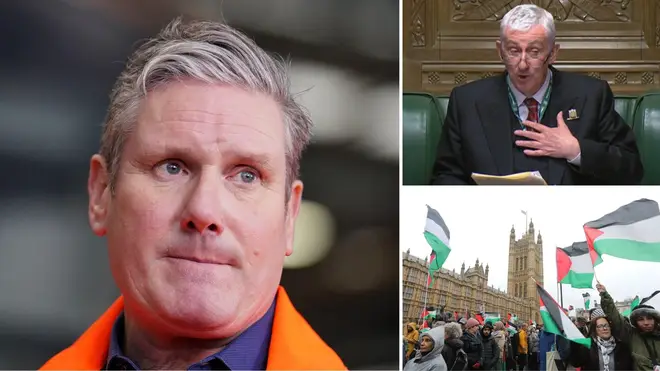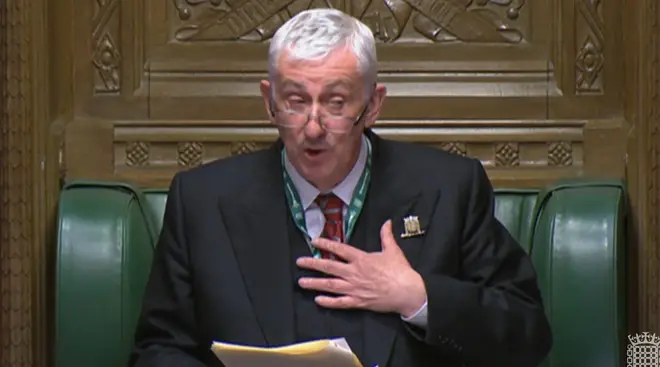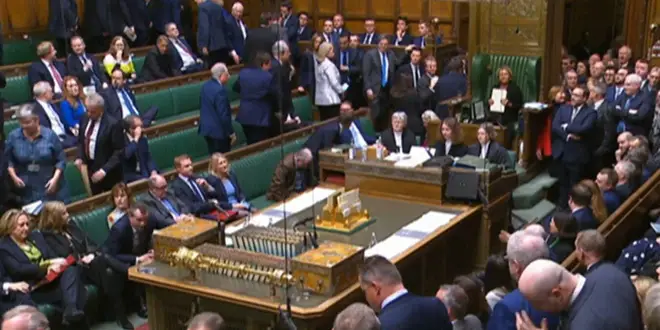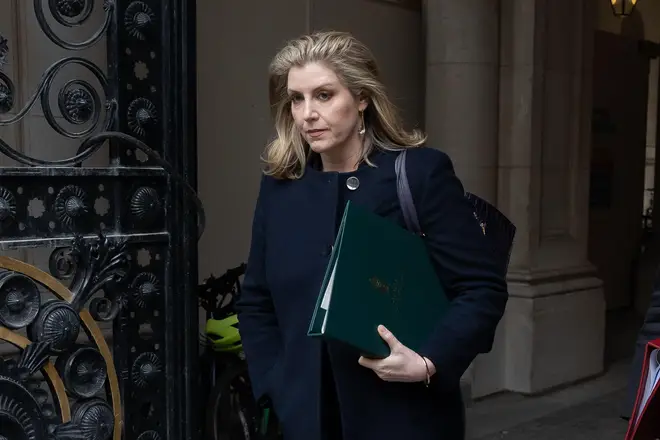
Ian Payne 4am - 7am
22 February 2024, 13:13 | Updated: 22 February 2024, 13:57

Sir Keir Starmer has "categorically" denied threatening Commons speaker Sir Lindsay Hoyle over the Gaza ceasefire vote.
Dozens of MPs have said they no longer have confidence in him after he broke convention to allow a vote on Labour's call for an end to the fighting.
Sir Lindsay says he wanted to allow for a broad debate on an important topic, and given the strength of public feeling about Israel's war with Hamas, was concerned for the security of MPs who are being bombarded with emails from constituents.
There have been suggestions Labour had tried to lean on him.
But speaking during a trip to Sussex, Sir Keir insisted: "I can categorically tell you that I did not threaten the Speaker in any way whatsoever.
"I simply urged to ensure that we have the broadest possible debate.
"So that actually the most important thing , which is what do we do about the situation in Gaza, could be properly discussed by MPs with a number of options in front of them."

Sir Lindsay, a former Labour MP, is understood to have no intention of quitting despite the growing number of signatures on a no-confidence motion.
He told the Commons on Thursday: "I will reiterate I made a judgement call that didn't end up in the position where I expected it to.
"I regret it. I apologise to the SNP... I apologise and I apologise to the House. I made a mistake. We do make mistakes. I own up to mine.
He added, as his voice broke: "And it has been said, both sides, I never ever want to go through a situation where I pick up a phone to find a friend, of whatever side, has been murdered by terrorists."
And he said: "I am guilty because... I have a duty of care that I will carry out to protect people.
"It is the protection that led me to make a wrong decision but what I do not apologise (for) is the risk that has been put on all Members at the moment. I had serious meetings yesterday with the police on the issues and threats to politicians for us heading to an election.
"I do not want anything to happen again."

Wednesday was designaed opposition day, with the SNP given the chance to choose what MPs vote on.
Usually on opposition days only the government can amend motions. But Sir Lindsay allowed Labour to have their own amendment be debated on, as well as the government's.
That prompted a mass walkout from furious Tory and SNP MPs, with several accusing him of allowing Labour to "hijack" the vote on a ceasefire.

Watch Again: Nick Ferrari speaks to Women's Health Strategy Maria Caulfield
At least 58 MPs have backed a motion of no confidence calling for him to quit as of midday on Thursday. But he retains the backing of others in Labour and even has support among some Conservatives.
There is no formal mechanism to remove a Speaker from office. In 2009, Speaker Michael Martin stepped down for his role in the parliamentary expenses scandal after 22 MPs backed a no-confidence motion - fewer than half the number who want Sir Lindsay to step down.
The speaker is due to meet with Penny Mordaunt, the leader of the House of Commons, and chiefs whips today, according to minister Maria Caulfield.

Natasha Clark joins Andrew Marr to discuss the fallout from the House of Commons today
Ms Caulfield, the minister for women's health strategy, said that the scenes on Wednesday evening were "a shambles".
She told LBC's Nick Ferrari: "We just felt as you saw the scenes unfold we just couldn't take part in it.
"It wasn't fair on the SNP and I'm not the SNP’s biggest supporter but to be fair to them they had a right to have a vote on their debate.
"I had hundreds of emails from my own constituents wanting me to vote one way or the other, and it was clear that this was not going to be a fair vote and we felt we just could not take part in it, and we wanted to walk away from the shambles that were ensuing.
"There's hostages still captured, there's a humanitarian crisis in Gaza, they are the issues that we should have been debating last night."
She added that it was "completely out of character" for Sir Lindsay and added: "He was absent from the chamber for most of the morning.
"It was clear there were some negotiations going on, some heated debates in the corridors around the chamber.
"And whether pressure was put on him by Labour, who were going to lose their vote, I don't know. But he went against the advice of the clerks of the House, that is a bit of a red line, but let's see what he says when he meets the leader of the House and the chief whips today."


The vote was meant to held on the SNP's call for an immediate ceasefire that would "stop the slaughter of innocent civilians" in Gaza. It also made reference to the "collective punishment" of Palestinians, which could effectively accuse Israel of a war crime.
Labour had concerns about the wording and amid fears that forcing its MPs to abstain on the SNP motion - knowing several of its politicians wanted to vote for it - could lead to resignations, the party tabled an amendment calling for an "immediate humanitarian ceasefire".
The Conservatives tabled their own amendment calling for a pause, instead of a ceasefire. Usual procedure for opposition days says only government amendments should be selected by the speaker.
But Sir Lindsay made the unusual move of allowing another opposition party's amendment to be put to a vote.
The Labour Party amendment was passed by the House - though it followed the mass walk out in process at Sir Lindsay.
Apologising to MPs and seemingly on the verge of tears, he told MPs that Wednesday's debate was "exceptional in its intensity with which all parties wished to secure a vote on their own propositions".
He said he accepted all three amendments in an attempt to reflect "the widest range of propositions on which to express a view" and also because he had become "very, very concerned about the security of all members".
But Sir Lindsay went on to admit that what he intended had not happened and said he recognised the "strength of feelings of members on this issue".

'The idea that somehow he could be bullied into taking a decision is completely wrong.'
Reports emerged overnight that Sir Lindsay had been pressured into allowing a vote on Labour's amendment by the party's leadership. Labour has denied this.
Asked whether she believed Sue Gray, the former civil servant and "Partygate" inquisitor, could have been involved, Ms Caulfield said: "She was definitely in conversation with heated conversations with Labour MPs who are wanted to vote for the SNP's motion.
"It's very, very surprising to see someone who's not an MP such as Sue Gray influencing MPs just ahead of a vote like that.
"You could hear quite raised voices, you could hear huddles going on, very unusual to see scenes like that. There was clearly an issue that the Labour party had with that vote and the rumours are that Sir Keir Starmer went to see the speaker to have a discussion with him."
Geoff Hoon, a former Labour chief whip, leader of the House, and defence secretary told Nick: "The idea that somehow the Speaker of the House of Commons could be bullied into taking a decision is completely wrong."
He added that "any attempt at bullying would be counter-productive."
In his previous roles Mr Hoon had regular meetings with the Speaker to decide Commons business, "and there was always someone else present," he said.